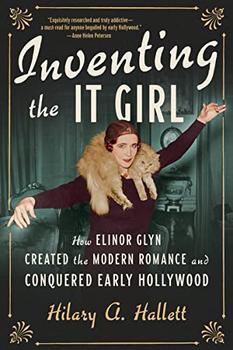Summary | Excerpt | Reviews | Beyond the Book | Readalikes | Genres & Themes | Author Bio

How Elinor Glyn Created the Modern Romance and Conquered Early Hollywood
by Hilary A. HallettExcerpt
Inventing the It Girl
This is an unconventional biography about an unconventional British woman, the late Victorian romance writer and celebrity author Elinor Glyn (1864– 1943) who midwifed much of the sexual ethos of Anglo- American popular culture. When she died peacefully in London, Glyn's obituaries called her "the founder of the modern sex novel" and "originator of the popular term 'It.'" They also recalled that the redheaded writer with cat-green eyes who had "shocked the world of our grandmothers" had "led a life as glamorous as anything in her novels," earning the friendship and respect of the most powerful and creative personalities in Britain, France, and America, through war and peace, over the half century between 1890 and 1940.
Elinor Glyn's life and legacy gives the lie to some of the most enduring assumptions regarding the dynamics involved in the ascent of mass culture. Most believe that the stories and images that took flight in the imaginations of so many people more than a century ago were man-made. Perhaps there is a vague awareness that women readers—long the primary consumers of fiction—and writers like Jane Austen were central from the start to the fortunes of the novel in Anglo-America (arguably its first mass culture). But that is all.
Nowhere has this notion about the assumed maleness of the movers and shakers who created our cultural past been more pervasive—or wrong—than in what has been called the basic story about the founding of Hollywood. This story focuses either on the creative genius of directors D.W. Griffith, Cecil B. DeMille, and Mack Sennett, or the business smarts of the mostly immigrant Jewish men who built the Hollywood studio system. As is often the case, the victor writes the history, and in the evolution of how power and prestige got distributed in the American film industry white men obviously won out.
But the reality of Hollywood's founding, as much recent work has shown, was far more complicated given that it was the least sex-segregated of America's major industries when Elinor Glyn arrived in Los Angeles in 1920. This startlingly unfamiliar landscape, in which many white women wielded considerable control, in part accounts for how Glyn managed "the paradox of bringing not only 'good taste' to the [movie] colony, but also 'sex appeal,'" as both Sir Cecil Beaton—perhaps the twentieth century's sharpest eye—and producer Samuel Goldwyn recognized.
Yet the durable belief that a masculine cast of characters established the dreamscapes of mass culture has consigned the influence of women like Elinor Glyn—who wrote of some of the most popular novels of her day, reoriented the romance genre, and set the mold for a new kind of female celebrity author and how to represent heterosexual sex in Hollywood—to the status of trash.
To be clear: this biographer has no interest in engaging debates about the relative artistic merits of Glyn's many creative works. Rather, Inventing the It Girl restores the impossibly elegant, witty tastemaker and prolific author—of more than forty books, countless magazine articles, and 27 stories that became films—to her rightful place at the fountainhead of mass culture. For it was there that this visionary lady with hedonistic leanings infused her fantasies and philosophies about sex, love, and marriage into the romantic aesthetic that shaped the desires of untold millions of her fans for generations to come.
Elinor Glyn's story begins in the privacy of her stepfather's library, where, like so many women who became writers in her day, she had unfettered access to the materials she would draw on to fashion her own ideas about how life and love should work. But her story gathers steam at the point where most romances have always ended: after her marriage up the social ladder in 1892 to Clayton Glyn, a member of the English gentry class who was far less well off than he appeared.
Excerpted from Inventing the It Girl: How Elinor Glyn Created the Modern Romance and Conquered Early Hollywood. Copyright © 2022 by Hilary A. Hallett. Used with permission of the publisher, W. W. Norton & Company, Inc. All rights reserved.
Education is the period during which you are being instructed by somebody you do not know, about something you do ...
Click Here to find out who said this, as well as discovering other famous literary quotes!
Your guide toexceptional books
BookBrowse seeks out and recommends the best in contemporary fiction and nonfiction—books that not only engage and entertain but also deepen our understanding of ourselves and the world around us.